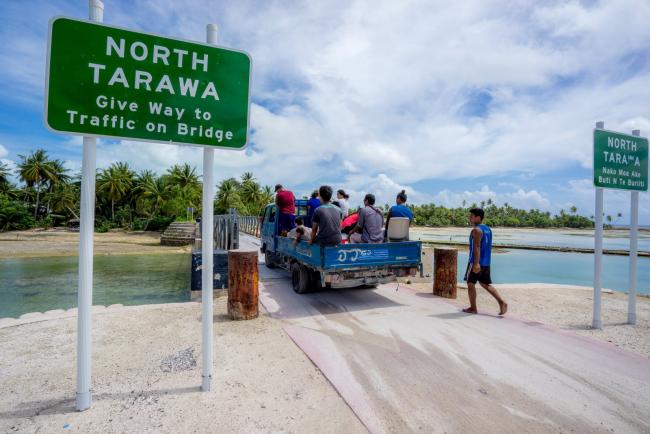Articles Menu

A new human-rights ruling says deporting a person to a country where they could be killed or seriously mistreated as a result of the climate crisis would violate an international treaty to which Canada is a party, according to the country’s UN refugee agency.
UNHCR Canada has told National Observer the Trudeau government needs to examine the domestic implications of a recent ruling by the UN Human Rights Committee, that found countries can't deport people seeking asylum as a result of threats related to the climate emergency.
It’s the first time a UN body has made this type of determination with respect to climate change. But the ruling by the 18-member committee, released Tuesday, is non-binding on Canada, and raises many complex questions as to how it will ultimately factor into Canada’s refugee system.
“In its decision, the UN Human Rights Committee has made clear that returning a person to a country where they face a risk to their life, or a risk of serious mistreatment, as a result of climate change-related environmental degradation would violate the International Covenant on Civil and Political Rights,” said Melanie Gallant, head of communications for UNHCR Canada.
“Like all states party to the international covenant, it is incumbent on Canada to consider the committee's decision and its implications domestically.”
The covenant is one of the main international human-rights treaties to which Canada is a party, along with others on subjects such as torture, genocide and racial discrimination.
Once someone is already in Canada, the country is obligated by those human-rights treaties to protect people who are considered to be refugees under the UN Refugee Convention, or whose removal would subject them to torture or severe mistreatment.
The UN Refugee Convention, however, does not explicitly mention climate change, which could complicate matters for climate refugees in Canada. The convention is concerned instead with well-founded fears of persecution for other reasons: race, religion, nationality, political opinion or membership in a social group. Resettled refugees, who are referred to Canada by the UNHCR, and other categories such as private sponsorship are also recognized under the convention.
The same sort of grounds of protection apply when asylum seekers are considered for a pre-removal risk assessment. When an individual is subject to a removal order, an officer from the Canada Border Services Agency will tell the person if they can apply for the assessment. Then an official from the immigration department carries out the evaluation, which is supposed to examine whether a person would face persecution, torture, risk to life or risk of cruel and unusual treatment or punishment.
Immigration, Refugees and Citizenship Canada (IRCC), the federal department, says it does monitor the implications of climate change on migration. But "we cannot speculate on future policy," spokeswoman Shannon Ker said.
The definition of a convention refugee is laid out in Canada’s Immigration and Refugee Protection Act. But the interpretation of that definition is an "ongoing process," says the Immigration and Refugee Board (IRB), the independent tribunal that decides refugee cases. "Some issues have been settled by the courts, others remain unanswered,” it noted in March 2019.
It is "incumbent on Canada" to consider a recent ruling by the UN Human Rights Committee on climate refugees, says @UNHCRCanada. It is the first time a UN body has made this type of determination.
Jamie Chai Yun Liew, an expert in immigration, refugee and citizenship law and an associate professor at the University of Ottawa, said no refugee-receiving country like Canada has within their own laws a recognition that speaks directly to people who are affected by climate-related situations and affords them refugee protection.
But while she said the ruling wouldn’t affect anything immediately in Canada, in the future it could lead to something more substantive. “This is a very important first step in international law, so to speak, for starting to recognize a legal basis for refugee protection for those that are affected by climate-related crises or situations,” Liew said.
For Francisco Rico-Martinez, co-director of the FCJ Refugee Centre, which looks at systemic issues newly-arrived refugee claimants face in Canada, the ruling could be useful when presenting in front of the IRB.
“I will go in that direction myself, to ask, ‘Why don’t we modify our humanitarian and compassionate program?’” Rico-Martinez said. “When a case like this has come to my office, we’ve always used the environmental situation, but we’ve tried to link it to other elements of persecution.”
Historic case opens door to #ClimateChange asylum claims UN #HRCttee finds that countries may not deport individuals who face climate change-induced conditions that violate the right to life.
http://ow.ly/5V4m50y0EFL #ICCPR
Canadian law indicates persons in need of protection should be subjected personally to risks. In other words, the risk has to be faced by the person in “every part of that country” and can’t also be faced “generally” by others in the country. That, too, could complicate matters for climate refugees in the Great White North.
The UN committee ruling did involve a personal case: that of Ioane Teitota, from Kiribati, a country of islands in the Pacific Ocean being swamped by rising waters. Teitota argued violence and deaths over the remaining land in his country forced him to migrate from the island of Tarawa to New Zealand, which deported him after denying his asylum application.
This all means it is less likely the UN Human Rights Committee would automatically expect Canada to immediately grant refugee status to all climate refugees, and more likely to expect the country to consider the alleged grounds of persecution each applicant faces — ostensibly the process that is already in place.
IRCC “monitors the implications of climate change on migration and displacement patterns and flows,” spokeswoman Béatrice Fénelon confirmed.
"The government of Canada recognizes that climate change is one of the greatest global challenges of our time, with broad implications on health, agriculture, economy, trade, infrastructure, displacement and migration," she said. "Developing countries, particularly the poorest and most vulnerable, are the hardest hit by climate change."
Fénelon also noted Canada can take action on a “case-by-case basis” in the event of a “natural disaster,” such as when it expedited immigration applications from Haitians with family in Canada after the 2010 earthquake.
"Canada’s refugee program is about saving lives and offering protection to the displaced and persecuted. Canada remains steadfast in offering protection to convention refugees," Fénelon said.

The UN human-rights committee ruling is the latest step in an international discussion sure to accelerate in the coming years, about how to deal with so-called “refugees of the blue planet” whose lives have been uprooted as a result of the degradation of the environment.
Scientists expect climate change to make sweeping changes to broad aspects of the planet that will affect hundreds of millions of people. The UN special rapporteur on extreme poverty and human rights has warned of “climate apartheid" where millions are cut off from food, water or housing.
UN High Commissioner for Refugees Filippo Grandi tried to underline the ruling’s significance at the World Economic Forum on Tuesday, telling Reuters “we must be prepared for a large surge of people moving against their will... we’re talking about millions here.”
Those millions would add to the more than 70 million people in 2018 who fled war, persecution and conflict, according to the UNHCR — the highest level of migration it has ever seen over its roughly 70-year existence.
Gallant from the UNHCR Canada office said they themselves were still examining the ruling and its potential implications.
"Climate change is a most pressing issue for us, and is at the heart of our work," she said.
"Not only because climate change can be a cause of displacement, but also because refugees and the communities that welcome them can be part of the solution."
[Top photo: The bridge connecting North and South Tarawa, an atoll in the Pacific nation of Kiribati that is facing the threat of rising sea levels from climate change, pictured in 2017. Asian Development Bank photo]